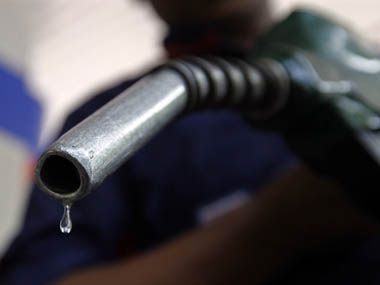Going, going and, yes, it’s gone.
With the international crude prices returning to $115 levels from $88 levels during end-June, the decontrol of the fuel prices is virtually impossible, at least for the time being.
On Thursday, oil marketing companies were incurring a loss of Rs 13.75 on sale of diesel, up from Rs 9.4/litre in July 2012, according to a research report by brokerage Prabhudas Lilladher.
The controlled decontrol of petrol limits the losses from the fuel to Rs 3.5 litre. This is because the companies have not been allowed to revise the prices since June.
The companies’ under recovery from the sale of subsidised diesel, kerosene and LPG stood at a record Rs 47,800 crore in April-June, according to Crisil Research.
[caption id=“attachment_429352” align=“alignleft” width=“380”]  With the international crude prices returning to $115 levels from $88 levels during end-June, the decontrol of the fuel prices is virtually impossible, at least for the time being. Reuters[/caption]
According to ICRA, the number could reach an all-time high in the current financial year, if crude oil prices and the rupee’s exchange rate against the dollar sustain at the current level for the rest of the fiscal and no price revisions happen.
The price differential between petrol and diesel is driving up sales of diesel vehicles, thus pushing the under recoveries further up.
The difference between the running cost for a petrol car vis-a-vis a diesel car has gone up 85 percent in the last seven to eight years, according to Crisil.
“This, in turn, has pushed up the share of diesel in overall petroleum product consumption to 44 percent from 36 percent during this period,” it said.
The losses and uncertainty over the government compensation are crippling the financials of the companies.
Their interest costs more than doubled to Rs 10,500 crore in 2011-12 from Rs 5,100 crore in 2010-11, according to Crisil.
OMCs’ aggregate profit fell to Rs 6,200 crore in 2011-12 from Rs 10,500 crore in 2010-11. They have fallen deep into the red in the first quarter this year, with total losses at Rs 40,500 crore. So much for the companies.
Burning a hole
Coming to the economy, the under-recoveries are sure to burn a big hole in the government finances.
In 2011-12, oil subsidies accounted for 16 percent of the country’s fiscal deficit.
The government’s commitment was to provide Rs 83,500 crore to the oil companies as compensation for discounted fuel sale. Of this, the government has managed to give only Rs 45,000 crore. The balance Rs 38,500 crore has been spilt over to the current financial year, when the fiscal deficit is seen widening further due to the deficient monsoon, forcing the government to increase its expenditure for welfare schemes.
With the government not willing to decontrol diesel, kerosene and LPG, the share of oil subsidy in the fiscal deficit will also increase.
This is likely to push the government to increase its borrowing, the Crisil note said.
“This, in turn, could exert further upward pressure on interest rates and will also limit the government’s ability to fund critical social and infrastructure projects,” it said.
The calls for deregulation is likely to fall on deaf ears this year, as the drought situation will increase diesel consumption by farmers-a key vote bank.
Petrol Price
A news report in The Times of India says the oil companies have approached the government for an increase in petrol prices.
The companies are caught between a rock and a hard place as they fear their record losses may raise the hackles of the comptroller and auditor general.
“We have started losing over Rs 3 per litre on the sale of petrol. The government is not going to compensate for this loss, petrol being a de-regulated commodity, and the CAG will hold us liable for this loss because of our failure to increase prices,” a board member of a leading oil PSU has been quoted as saying in the report.
The report said the oil PSUs expect a decision only after the parliament session ends in September first week.
But will a petrol price increase be followed by a similar move on diesel?
Very unlikely, as the drought and a resulting spiral of inflation are likely to be bigger concerns for the government this year.
So, even if the oil prices fall to $90 levels with key economies like China and India slowing down, do not expect a change in the prices of diesel.
Yes, politics rules.


)
)
)
)
)
)
)
)
)



